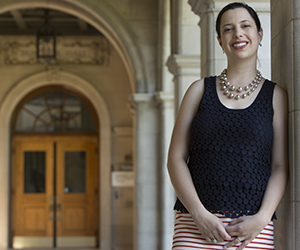Anton DiSclafani, writer in residence at Washington University in St. Louis, talks about the “thunderbolt moment”: That one line or phrase that comes to a writer out of the blue, grabs hold of precious brain matter and won’t let go.
For DiSclafani, her thunderbolt came nearly seven years ago when the writer was teaching part time in WUSTL’s Department of English in Arts & Sciences as part of her three-year fellowship program.
Living with her husband, Mathew Smith, also a writer, in a Delmar Loop-neighborhood apartment close to the university, DiSclafani already had an idea for a novel about a young girl sent away from her family.
She had even kicked around a setting: a camp called Yonahlossee. She got the unusual name from a camp she stayed near in the Blue Ridge Mountains of North Carolina, where she had vacationed as a girl. But the story hadn’t really materialized.

Then one night, while battling a bad cold and insomnia and sleeping in a separate room from her husband, she woke up with the opening line in her head: I was fifteen years old when my parents sent me away to the Yonahlossee Riding Camp for Girls.
After that, “I just started writing,” said the Tennessee native who grew up in northern Florida.
DiSclafani’s debut novel, The Yonahlossee Riding Camp for Girls, from Riverhead Books, a division of Penguin Group, was released June 4 to critical acclaim.
The book is a result of a reported seven-figure publisher bidding war, which includes foreign rights in 12 countries, and finds itself on scores of “must-read” summer book lists, from the likes of The Hollywood Reporter and Entertainment Weekly to The Wall Street Journal and Publishers Weekly.
DiSclafani came to WUSTL’s esteemed writing program in 2004 as a master of fine arts student in creative writing and stayed after graduating in 2006, thanks to mentors such as Kathryn Davis, Hurst Writer in Residence, and Marshall Klimasewiski, senior writer in residence, both in the English department.
She is taking success — or the hint of it, at least — in stride.
“I was just really hoping that the book would sell,” she said. “People don’t really believe me when I say that, but there are a lot of good writers whose books haven’t sold. The publishing industry is tough.”
The novel is a coming-of-age story set in 1930, just as the economics of the Great Depression are becoming a reality for every facet of society.
The plot centers on 15-year-old Thea Atwell, an upper middle-class daughter of a small-town doctor, who gets sent away to an equestrienne boarding school for something’s she done.
“It took me about two years to write the first draft and another year to revise and find an agent,” said DiSclafani, who grew up riding horses. “I revised it some more with my agent for another two-and-a-half years, and then I sold it.”
Sounds easy, right? Hardly. The bulk of the book was written, DiSclafani said, at Panera Bread Co., a coffee shop in the Loop. At the time, she and Smith, who also earned his MFA from WUSTL, were living in an under-insulated apartment in which heating the entire unit cost more than a month’s rent.
“I’d get up, put on some clothes, grab my laptop and head to Panera for two or three hours to write before moving on with my day,” she said, a day that could have included, at given times, one of four jobs: teaching, seasonal work at Williams-Sonoma, babysitting and transcription work.
“All part time,” she said. “All the things that writers — or anybody who doesn’t have a full-time job — do to make ends meet. I would get up four hours earlier than wherever I needed to be, and just write.”
DiSclafani is happy to add that she and her husband live in a fully insulated apartment in St. Louis now, but she still keeps that work ethic. It served her well when it came time for the revision process.
“This book is pretty heavily revised,” she said. “At some point, I want to show my students the original manuscript and the final product because they’ll be vastly different. Students hate revising — which I did too as an undergrad — but it’s such an important part of the process.”
An example, she said, is how much of the novel’s setting — the Depression of 1930-31 — plays a role in the novel’s plot.
“When I was in the middle of revising, the big economic collapse of 2008 happened and a lot more of the Depression went into the revision,” she said. “There were all these changes happening. People were being forced into making choices that were different than what they might have expected, and that’s what I was interested in with the girls at the camp — the sense that the future is not just open for the taking.”
DiSclafani’s immediate future however, is a blank slate but, if readers catch on, considerably bright. She began a national book tour in St. Louis June 5, hosted by Subterranean Books at the Schlafly Branch of the St. Louis Public Library.
From there, she headed to North Carolina and other points south before hitting Texas, California, Chicago and beyond. She’ll return to WUSTL in August — teaching a course in historical fiction and one in nonfiction – and, of course, writing and waiting for the next thunderbolt moment.
To learn more about DiSclafani and the Yonahlossee Riding Camp, visit http://antondisclafani.com/.
To hear an audio clip of DiSclafani, visit https://thought.artsci.wustl.edu/podcasts-retellings/preview.
To learn more about the Department of English in Arts & Sciences and the programs available in writing at WUSTL, visit http://english.artsci.wustl.edu/writing.